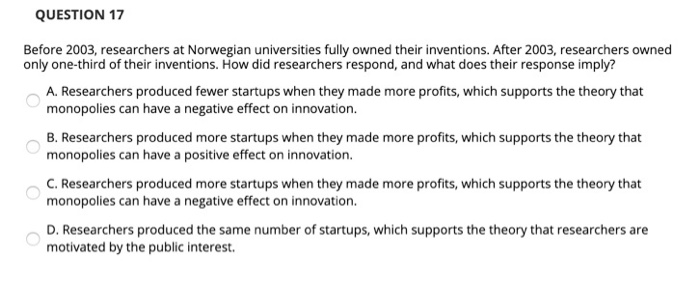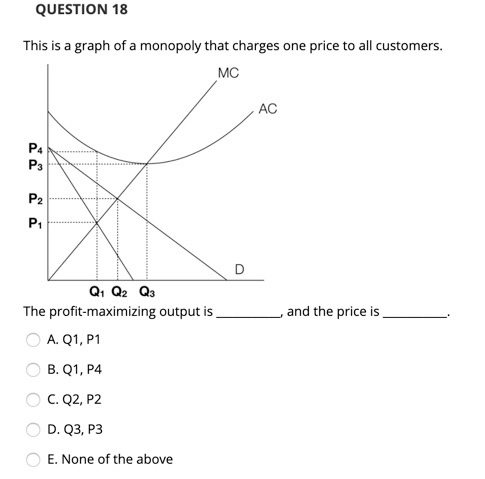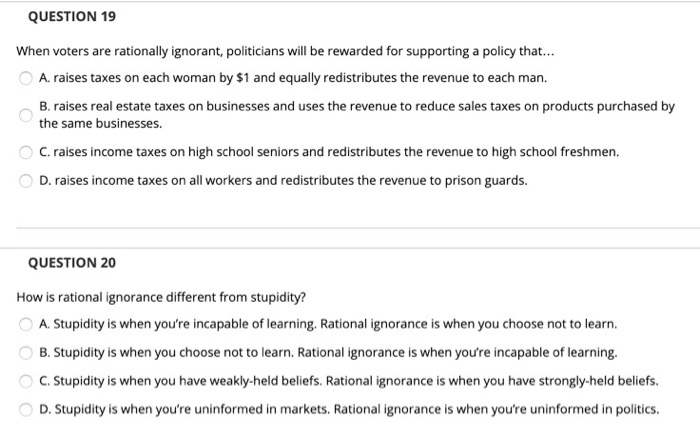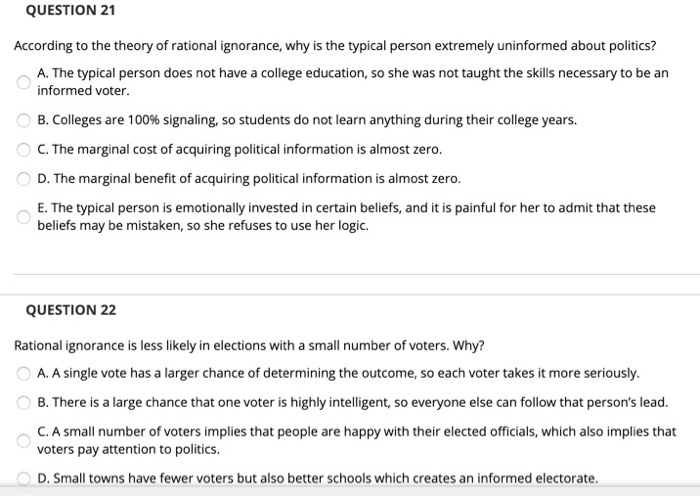Answered step by step
Verified Expert Solution
Question
1 Approved Answer
QUESTION 17 Before 2003, researchers at Norwegian universities fully owned their inventions. After 2003, researchers owned only one-third of their inventions. How did researchers




QUESTION 17 Before 2003, researchers at Norwegian universities fully owned their inventions. After 2003, researchers owned only one-third of their inventions. How did researchers respond, and what does their response imply? A. Researchers produced fewer startups when they made more profits, which supports the theory that monopolies can have a negative effect on innovation. B. Researchers produced more startups when they made more profits, which supports the theory that monopolies can have a positive effect on innovation. C. Researchers produced more startups when they made more profits, which supports the theory that monopolies can have a negative effect on innovation. D. Researchers produced the same number of startups, which supports the theory that researchers are motivated by the public interest. QUESTION 18 This is a graph of a monopoly that charges one price to all customers. MC P4 P3 P P Q1 Q2 Q3 The profit-maximizing output is. A. Q1, P1 B. Q1, P4 C. Q2, P2 D. Q3, P3 E. None of the above AC and the price is QUESTION 19 When voters are rationally ignorant, politicians will be rewarded for supporting a policy that... A. raises taxes on each woman by $1 and equally redistributes the revenue to each man. B. raises real estate taxes on businesses and uses the revenue to reduce sales taxes on products purchased by the same businesses. C. raises income taxes on high school seniors and redistributes the revenue to high school freshmen. D. raises income taxes on all workers and redistributes the revenue to prison guards. QUESTION 20 How is rational ignorance different from stupidity? A. Stupidity is when you're incapable of learning. Rational ignorance is when you choose not to learn. B. Stupidity is when you choose not to learn. Rational ignorance is when you're incapable of learning. C. Stupidity is when you have weakly-held beliefs. Rational ignorance is when you have strongly-held beliefs. D. Stupidity is when you're uninformed in markets. Rational ignorance is when you're uninformed in politics. QUESTION 21 According to the theory of rational ignorance, why is the typical person extremely uninformed about politics? A. The typical person does not have a college education, so she was not taught the skills necessary to be an informed voter. B. Colleges are 100% signaling, so students do not learn anything during their college years. C. The marginal cost of acquiring political information is almost zero. D. The marginal benefit of acquiring political information is almost zero. E. The typical person is emotionally invested in certain beliefs, and it is painful for her to admit that these beliefs may be mistaken, so she refuses to use her logic. QUESTION 22 Rational ignorance is less likely in elections with a small number of voters. Why? A. A single vote has a larger chance of determining the outcome, so each voter takes it more seriously. B. There is a large chance that one voter is highly intelligent, so everyone else can follow that person's lead. C. A small number of voters implies that people are happy with their elected officials, which also implies that voters pay attention to politics. D. Small towns have fewer voters but also better schools which creates an informed electorate.
Step by Step Solution
★★★★★
3.45 Rating (158 Votes )
There are 3 Steps involved in it
Step: 1
The detailed answer for the above question is provided below Answer 17 Researchers produced fewer st...
Get Instant Access to Expert-Tailored Solutions
See step-by-step solutions with expert insights and AI powered tools for academic success
Step: 2

Step: 3

Ace Your Homework with AI
Get the answers you need in no time with our AI-driven, step-by-step assistance
Get Started


